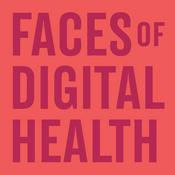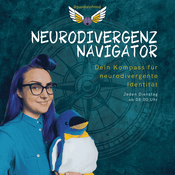376 Episoden
Are Engaged, AI Equipped Patients Becoming Essential For Good Outcomes? (Dale Atkinson)
17.2.2026 | 50 Min.In this episode of Faces of Digital Health, Tjaša Zajc speaks with Dale Atkinson, a stage 4 oesophageal cancer patient who was told he had 11.5 months to live—and who is still alive today. Dale shares how he applied his compliance and investigation skills to healthcare: reading thousands of research papers, building a research-grounded AI workflow to sense-check drug interactions and pathways, and learning how to communicate with clinicians to be taken seriously.
We discuss patient agency, the doctor–patient relationship, the promise (and risks) of AI for patients, the digital divide in healthcare, and why quality of life must be central to care decisions. Dale also shares how his journey led to new work in patient advocacy, the Beyond the Standard foundation, and the Clear Path Clinic vision for integrative oncology and wellness.
Topics include: patient empowerment, AI in patient journeys, evidence-based complementary approaches, healthcare equity, clinician workload, prognosis anxiety, and new patient-led models of care.
TIMESTAMPS (CHAPTER-STYLE)
* 00:01 Intro: why patient agency matters more as systems strain
* 04:12 Dale’s story begins: diagnosis after wife’s lung cancer + mother’s death
* 07:22 Stage 4, inoperable, palliative care: the emotional impact
* 08:31 Asking for a timeline: why Dale wanted prognosis data
* 09:18 How a financial crime investigator becomes a “patient investigator”
* 10:55 The deep dive: thousands of papers, books, and expert conversations
* 12:09 Where AI enters: building a research-grounded model for sense-checking
* 15:00 Standard of care + complementary approach (not “alternative”)
* 16:08 Friction with clinical advice; nutrition and chemo trade-offs
* 17:48 Choosing treatments based on quality of life and realistic benefit
* 20:06 When Dale felt the trajectory could change: from survival to stability
* 21:11 Anxiety, recurrence risk, and “no evidence of disease” vs remission
* 24:46 Missed symptoms, dismissal, and why patient agency is learned the hard way
* 28:32 “Love-hate” to collaborative: a new model for doctor–patient dynamics
* 32:16 How to communicate to be heard: bite-sized, stakeholder-specific info
* 35:28 Clinicians under pressure: emotional load and “factory line” care reality
* 37:58 AI impact in the patient community—and why it’s accelerating
* 40:27 Digital divide concerns: will digital skills determine outcomes?
* 42:36 AI and emotion: pessimism loops, “horror statistics,” and mental safety
* 45:02 A new career: Beyond the Standard, Clear Path Clinic, book, advisory work
* 49:25 Closing reflections and thanks
Video: https://youtu.be/VeIZkRraxWc
www.facesofdigitalhealth.com
Newsletter: https://fodh.substack.com/- Digital health is no longer in its honeymoon phase.
The funding boom is over. AI hype is everywhere. Health systems are overwhelmed. And startups can no longer survive on compelling pitch decks alone.
In this episode of Faces of Digital Health, Tjaša Zajc speaks with Ruchi Dass, a former dental surgeon turned public health leader, policy contributor, investor, and advisor to startups scaling across the US, UK, India, Africa, and the Middle East.
Ruchi describes a fundamental change in go-to-market (GTM) strategy:
Workflow integration is non-negotiable (standalone apps struggle).
Reimbursement clarity is critical.
Regulatory strategy is part of GTM, not an afterthought.
Time stamps:
00:06 – Introduction: startups, global markets, and unconventional careers
01:18 – From dental surgery to global public health and digital health
03:05 – The GTM shift: from promise to proof
04:49 – Staying investable: the four pillars
08:22 – AI ROI: clinical vs operational value
12:17 – Enterprise scaling and “sell to the mindset”
15:05 – Responsible AI: transparency, bias, and lifecycle regulation
19:56 – Predictability vs black-box AI in medicine
22:44 – Global innovation differences: Europe, India, Middle East, Africa
26:21 – Pilotitis: why pilots fail to scale
28:40 – Designing pilots for commercialization
30:26 – Capital flows, geopolitics, and reverse innovation
34:25 – The $1 teleconsultation model in India
37:56 – Digital health and equity: design vs digitization
42:43 – How regulators can keep up with AI
46:03 – Advice for Gen Z and Gen Alpha in digital health
48:50 – Grassroots realities shaping policy
Watch the full discussion: https://youtu.be/bmvPzz3Ffp4
www.facesofdigitalhealth.com
Newsletter: https://fodh.substack.com/ - In this episode of Faces of Digital Health, host Tjasa Zajc sits down with Bart de Witte for a candid conversation on what agent-based AI really means for healthcare.
Recorded during a car ride in Ljubljana, the discussion explores why healthcare needs an operating system for AI agents, the risks of agent autonomy, privacy-by-design through on-device AI, and why monolithic EHRs struggle with the next generation of clinical workflows.
Bart also shares his vision for open, decentralized AI ecosystems, certified clinical agents, and swarm intelligence and explains why Europe may be uniquely positioned to lead this shift.
A practical, forward-looking episode for anyone working at the intersection of healthcare, AI, and digital infrastructure.
Youtube video version: https://youtu.be/F_GRfIbqJJM?si=qheSsKvcg6WXUqTU - As artificial intelligence rapidly enters healthcare, bold claims about replacing doctors dominate headlines. But on the clinical frontline, the reality is far more complex.
In this episode of Faces of Digital Health, oncologist Dr. Derrick Khor shares an unfiltered view from inside the NHS, unpacking what AI actually changes — and what it doesn’t.
Rather than framing AI as a threat, the conversation explores how it already supports clinicians and patients alike: simplifying complex medical information, helping patients understand their diagnoses, and accelerating access to evidence. Yet the biggest constraint isn’t technology — it’s data. Without reliable access to their own health records, patients and AI tools alike remain limited.
The discussion also tackles a growing contradiction in healthcare systems: simultaneous staff shortages and doctor unemployment. Training bottlenecks, hiring freezes, pay erosion, and misaligned workforce planning have created a situation where well-trained clinicians struggle to find roles, even as demand for care continues to rise.
Beyond workforce pressures, Dr. Khor explains why most health tech never makes it into daily clinical use. Solutions often fail not because they’re unsafe or ineffective, but because they don’t fit real workflows. If technology adds friction even a single unnecessary click — clinicians won’t adopt it.
www.facesofdigitalhealth.com
https://fodh.substack.com/ Voice tech and AI: Is Detecting Diseases Based on 45 s of Voice Accurate? (Henry O'Connell)
22.1.2026 | 1 Std. 10 Min.Ambient documentation is becoming normal in clinics. But the most interesting “voice” capability may not be transcription at all.In the latest episode of Faces of Digital Health, Henry O'Connell (Canary Speech) explains why voice biomarkers stalled for decades: the field analyzed words, not the neurological signal behind speech production.Canary’s approach focuses on the “primary data layer”—how the central nervous system drives respiration, vocal cord vibration, and articulation in real conversational speech.
A few details that stood out:
⏱️ ~45 seconds of conversation can be enough for assessment
🎛️ 2,590 voice features analyzed every 10ms (millions of data points)
🎯 Reported accuracy: 98%+ for progressive neurological conditions (e.g., Parkinson’s/Huntington’s/Alzheimer’s), while behavioral health tends to be lower (often in the 80s)
🌍 Validation is repeated per language/culture—no “deploy and hope” model
🧭 Use cases go beyond diagnosis: screening in primary care, clinical trials outcome tracking, and even in-room aggression risk signals to help protect staff
One line that captures the idea: it’s about measuring what’s present in the moment—objective signals that complement clinical judgment.
Time stamps:
00:00 Introduction to Voice Biomarkers in Digital Health
01:48 Historical Context and Evolution of Voice Analysis
06:52 Innovative Approaches to Voice Data Analysis
08:54 Technical Insights into Voice Analysis
16:07 Accuracy and Efficacy of Voice Biomarkers
28:27 Challenges and Acceptance in Clinical Practice
35:04 Ethical Dilemmas in Genetic Testing
36:32 Understanding Genetic Information and Its Implications
37:58 Objective vs. Subjective Assessments in Mental Health
39:59 Proactive Care and Early Detection of Cognitive Decline
42:43 Technology in Wellness and Employee Mental Health
45:18 Data Privacy and Ethical Considerations in Health Tech
49:06 Remote Monitoring and Clinical Trials
01:00:57 Future of Health Technology and Global Expansion
Youtube: https://youtu.be/662VfHhdSFQ?si=t80_PblCf1L6dv4V
Website: www.facesofdigitalhealth.com
Newsletter: https://fodh.substack.com/
Weitere Gesundheit und Fitness Podcasts
Trending Gesundheit und Fitness Podcasts
Über Faces of Digital Health
Faces of Digital Health is a podcast about digital health, exploring how different healthcare systems adopt technologies in healthcare. Its aim is to satisfy curiosity about different cultures, identify barriers to success in different countries and finding answers and advice for accelerating the success of digital health entrepreneurs.
Podcast-WebsiteHöre Faces of Digital Health, Psychologie to go! und viele andere Podcasts aus aller Welt mit der radio.de-App

Hol dir die kostenlose radio.de App
- Sender und Podcasts favorisieren
- Streamen via Wifi oder Bluetooth
- Unterstützt Carplay & Android Auto
- viele weitere App Funktionen
Hol dir die kostenlose radio.de App
- Sender und Podcasts favorisieren
- Streamen via Wifi oder Bluetooth
- Unterstützt Carplay & Android Auto
- viele weitere App Funktionen


Faces of Digital Health
Code scannen,
App laden,
loshören.
App laden,
loshören.








































